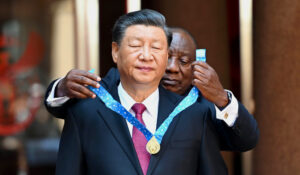As the war was starting in the early hours of February 24, 2022, when the CIA was forecasting Kyiv’s imminent fall and a quick victory for Moscow, a wealthy Russian friend mailed me for my views. His own were conveyed by the words “absolutely beyond any reasonable apprehension”.
That is, my friend was extremely anxious even before he found out that he was no longer a normal human being who could only be charged and prosecuted for a specific crime: he had become an “oligarch” and, as such, a criminal associate of war-criminal Putin. This made him subject to the confiscation of whatever he owned anywhere outside Russia, which I imagine is quite a lot.
It was a very 20th-century development: first, create a thoroughly pre-condemned category; then, without any need for evidence, list your enemies as belonging to it. For the Bolsheviks, that category was “counter-revolutionary”, quite enough for a bullet and, under Stalin, a train journey to the gulag. The Nazis had their purely racial definition of “Jew”, thereby preventing escape-by-conversion as in almost all prior persecutions, including Spain’s in 1492.
Then came Mao’s definition of “landlord”: as soon as the Communists came to power, anyone so labelled in a Chinese village, including the owners of very modest plots, lost their house and contents along with their land and food supply. That did not, however, cause much starvation — since many landlords, or rather ex-landlords by then, were simply killed, with any desirable spouses redistributed as concubines or pressured into marrying their late husband’s persecutors. When Mao unleashed his Cultural Revolution in 1966, he needed no fewer than nine categories to snag his millions of enemies: ex-landlords, “rich” peasants (three pigs were enough), counter-revolutionaries, bad elements, rightists, traitors, foreign agents, capitalist roaders and the “Stinking Ninth”: intellectuals.
Xi Jinping’s father, Xi Zhongxun, already in exile for having inadvertently published the biography of a Communist hero whom Mao secretly hated, had more than one category listed on the heavy placard hanging from his neck when he was brought back to Beijing to run the gauntlet, while Xi’s mother, herself periodically beaten, was shouting abuse at every step. More than 36 million were beaten or killed under one or more of Mao’s nine categories, including those who were sliced, barbecued and eaten in the Guangxi Zhuang Autonomous Region.
So far, nobody has suggested the public execution of the Russian oligarchs. But the category has been very firmly established in the collective minds of public opinion as irremediably criminal, and the names of those listed have been widely publicised and pounced upon. Along with unpublicised restrictions, confiscations and humiliations, Putin’s invasion triggered the much-televised confiscation of yachts all over the world, causing a global effusion of schadenfreude.
It was with a cheerful tweet that French Finance minister Bruno LeMaire personally announced the early seizure of Igor Sechin’s 280-foot yacht Amore Vero in a repair yard near Marseilles: “I thank French customs officers who ensure the respect of the European Union’s sanctions against those near to power in Russia.” There had been no French trial proving that Sechin had committed a crime; with the “category” short-cut, none is needed.
LeMaire did cite European Union sanctions, which hardly applied when the government of Fiji, nowhere near EU membership, seized the 348-foot Amadea of Suleyman Kerimov. Not to be outdone, the Spanish police seized the 255-foot Tango because its owner was Viktor Vekselberg, whom the US Treasury Department listed as having close ties to Putin.
Italy’s first seizure was the Lady M, only 213 feet long, not much given that its owner was Alexei Mordashov, Russia’s richest businessman. But he was not the richest for nothing: Mordashov’s real yacht with two helicopter pads and a waterfall was safe in the Seychelles. (Yes, the waterfall is a bit much, but the fact remains that no court has proven that Mordashov is a criminal.) Italian officials also seized Gennady Timchenko’s Lena, with five cabins but worth only a measly $8 million: in Portofino, if your yacht is worth $8 million, you anchor it well out of sight, and in Monaco they will not let you in at all. In no case was there a trial, or evidence of wrong-doing presented.
None of this was supposed to happen when the US Treasury published its list of 96 Russian oligarchs in 2018 — that being the mother of all lists but for Canada’s, which includes names unmentioned by anyone else, possibly because of clerical errors. The Treasury document made it crystal clear that it was not listing criminals of any sort: “in no way should [the list] be interpreted to impose sanctions on those individuals or entities.” It continued: “[inclusion in the report] does not constitute the determination by any agency that any of those individuals or entities meet the criteria for designation under any sanctions program… [nor that] the US Government has information about the individual’s involvement in malign activities.”
So why did the US Treasury publish the list at all? The straightforward answer is that it had no choice: intense lobbying had resulted in the “Countering America’s Adversaries Through Sanctions Act of 2017” which required the Secretary of the Treasury to submit a detailed report on “senior political figures and oligarchs in the Russian Federation”. The Treasury then published its list, mingling real rogues with lucky businessmen and brilliant entrepreneurs. Officials told the press and all who would listen that the only criterion for inclusion was simply to have a Russian name in Forbes’s list of individuals with a net worth over $1 billion. The 2017 Act had provided for consultations with the Director of National Intelligence to obtain specific information, but none of the 17 different intelligence agencies he controls has more than one or two Russian readers on staff, and they are much too busy to research biographies. And so the pre-condemned category “oligarch” was created…
Back to today, the latest word from Brussels is that European Union officials have become queasy about the indiscriminate use of “oligarch”, which is now displaced by “influential Russian entrepreneur” in EU documents. But this hardly makes a difference; there has been a colossal violation of that very great blessing that allows honest citizens to sleep soundly, and that Russia tragically lacks: The Rule of Law. Defined by just four short Latin words nulla poena sine lege (“no penalty without a law”), it requires specificity in defining crimes and not just a label, whether it is oligarch or the EU’s “influential Russian entrepreneur.
Anybody who is not troubled by what has happened to the 96 listed by the US Treasury, with its categorical but totally ignored disclaimers, is morally in the same boat as those who are indifferent to Russia’s aggression against Ukraine. Between us and oppression there is only the Rule of Law, which can never be compromised without evil consequences.
Disclaimer
Some of the posts we share are controversial and we do not necessarily agree with them in the whole extend. Sometimes we agree with the content or part of it but we do not agree with the narration or language. Nevertheless we find them somehow interesting, valuable and/or informative or we share them, because we strongly believe in freedom of speech, free press and journalism. We strongly encourage you to have a critical approach to all the content, do your own research and analysis to build your own opinion.
We would be glad to have your feedback.
Source: UnHerd Read the original article here: https://unherd.com/




